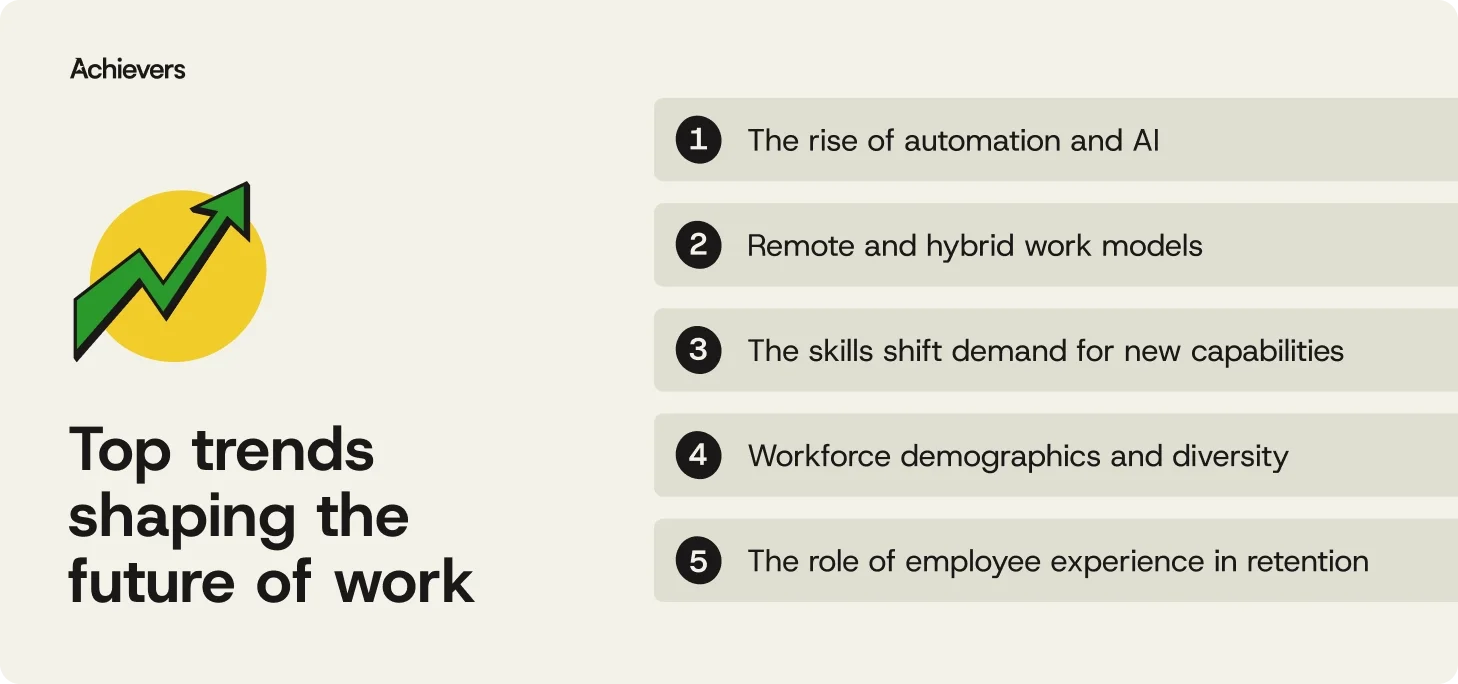Table of contents
The future of work isn’t just coming — it’s already here. AI is advancing by the day, remote work is becoming the new normal (again), and the pace of change is enough to make your calendar app sweat.
For business leaders, HR teams, and employees alike, one thing is clear: keeping up isn’t enough. To thrive, you need to get ahead — shaping a workforce that’s ready for whatever’s next.
In this post, we’re digging into five workplace trends that are reshaping how, where, and why we work — and sharing what you can do today to stay ahead of the curve tomorrow. Let’s get into it.
What is the future of work?
It’s not a sci-fi concept — it’s already here, quietly rewriting job descriptions and rethinking what a “normal” workday looks like. The future of work is shaped by AI, automation, hybrid models, and an employee experience that (finally) puts people first. Think less ping-pong tables, more purpose.
As tech reshapes how work gets done, employee expectations are shifting just as fast. Flexibility, inclusion, well-being, and growth aren’t perks — they’re table stakes. Add in the rise of skills-based hiring, and it’s clear: job titles matter less than what people can actually do.
Organizations that lean into this change — by adapting quickly, recognizing what matters, and investing in their people — won’t just survive. They’ll shape the future of work from the inside out.
The 5 key trends shaping the future of work
If it feels like the workplace is changing faster than your Wi-Fi can keep up, you’re not imagining things. Technology is evolving, expectations are shifting, and the once-stable 9-to-5 is becoming a choose-your-own-adventure. To stay ahead, organizations need to do more than keep pace — they need to embrace what’s next.
Here are five trends rewriting the rules of work — and what they mean for your people and your business:

1. The rise of automation and AI
Let’s be honest: AI isn’t just knocking — it’s already in the building. From automating the boring stuff to unlocking new strategic opportunities, AI and automation are reshaping job roles across the board. In fact, a study by Amazon Web Services (AWS) found that 92% of organizations plan to adopt AI-powered solutions by 2028, expecting a productivity boost of up to 49%.
But with this shift comes a new reality: employees need the right skills to thrive alongside AI. As the use of AI in HR grows — from talent acquisition to performance management — the focus isn’t on replacing people but empowering them. That’s why forward-thinking companies are investing in upskilling and reskilling programs that help their teams adapt, grow, and lead in an AI-enhanced world. Smart move — the bots can handle the grunt work, but they still can’t lead a brainstorm (yet).
2. Remote and hybrid work models
Remember when remote work was a “perk”? Now it’s just work. Thanks to the pandemic, hybrid and remote setups are here to stay — and employees are all in. 96% say these models improve their mental health, and productivity has jumped 13% compared to the in-office-only days.
Still, flexibility isn’t a free-for-all. Remote work can come with isolation, blurred boundaries, and collaboration hiccups. And hybrid work? It brings all that — plus the logistical fun of trying to coordinate a meeting when half the team is in the office, two are on a beach with Wi-Fi, and one forgot it was Tuesday. The companies that succeed are the ones using digital tools to bridge the gaps, creating connections across time zones, and building cultures where autonomy doesn’t mean disconnect.
3. The skills shift demand for new capabilities
In today’s job market, it’s not just about what degree you have — it’s about what you can do. The spotlight is on skills-based hiring, as demand grows for digital, human, and AI fluency. In fact, 75% of recruiting professionals say skills-based hiring will be a priority over the next 18 months, with many employers placing more value on capabilities than credentials.
That puts lifelong learning on center stage. Employers that offer accessible training, mentorship, and AI-driven development opportunities aren’t just closing the skills gap — they’re building a more agile, engaged, and future-ready workforce. Because let’s face it — in a world that changes this fast, adaptability might just be the most valuable skill of all.
4. Workforce demographics and diversity
Today’s workforce is more multigenerational, multicultural, and multidimensional than ever — and that’s a good thing. Companies that prioritize diversity, equity, and inclusion (DEI) aren’t just doing the right thing — they’re doing the smart thing. Research shows that corporations identified as more diverse and inclusive are 35% more likely to outperform their competitors.
A strong DEI strategy goes beyond hiring practices. It’s about inclusive leadership, equitable growth opportunities, and a culture where every employee feels seen, heard, and valued — no asterisks, no fine print.
5. The role of employee experience in retention
What keeps employees around? It’s not just a paycheck — it’s purpose, recognition, and the opportunity to grow. A recent PwC survey revealed that 28% of workers are likely to change employers in the next year, and one of the top reasons is the chance to learn new skills.
Meanwhile, the same study finds that 82% of workers who use generative AI daily believe it makes their work more efficient — another signal that integrating smart tools enhances the overall employee experience.
The future of work: challenges and how to get ahead of them
The future of work brings exciting possibilities — smarter tools, more flexible ways of working, and a renewed focus on what really matters. But it’s not all smooth sailing. Businesses navigating this new world need to anticipate the bumps, not just ride the wave.
Here’s a look at the biggest challenges ahead — and how to turn them into opportunities:
Challenge: AI is changing jobs — and raising eyebrows
AI and automation are streamlining workflows and boosting productivity, but they’re also triggering real concerns about job security. McKinsey predicts up to 30% of hours worked in the U.S. could be automated by 2030. That’s a big shift — and one that calls for action.
Solution
Help people grow with the tech, not get left behind. By investing in upskilling and reskilling, businesses can prepare employees for roles that leverage what machines can’t: creativity, critical thinking, and empathy.
Challenge: Remote work can isolate more than it liberates
Flexibility is fantastic — but hybrid and remote setups aren’t without their pitfalls. Disconnection, Zoom fatigue, and a fading sense of culture can leave teams feeling scattered.
Solution
Make connection intentional. Regular check-ins, strong digital collaboration tools, and frequent recognition programs help keep teams aligned, motivated, and (yes) human, no matter where they log in from.
Challenge: The skills gap is widening
As technology advances, yesterday’s skills don’t always cut it. Digital literacy, AI fluency, and soft skills like adaptability and communication are in higher demand than ever.
Solution
Build a culture of continuous learning. Whether it’s through mentorship, on-demand training, or AI-driven development platforms, give employees the tools they need to keep evolving — and thriving.
Challenge: Burnout is becoming business as usual
When the lines between work and life blur, well-being suffers. Always-on cultures don’t just wear people down — they wear businesses out.
Solution
Treat employee well-being as a strategy, not a side note. Flexible policies, mental health resources, and recognition that actually means something can go a long way toward building a more energized, engaged workforce.
Embrace the future of work with confidence
The world of work is changing fast — AI, automation, hybrid models, new skills, evolving expectations… it’s a lot. But it’s also a huge opportunity. For businesses and employees alike, the path forward is clear: adapt, invest in learning, and build cultures that put people first.
That’s where Achievers comes in. With tools that drive recognition, retention, and real performance, we help organizations shape workforces that aren’t just ready for the future — they’re excited about it.
So yes, the future of work is complex. But with the right mindset — and the right tech — you can face it with confidence (and maybe even a little excitement). Ready or not, here it comes. Better to be ready.



